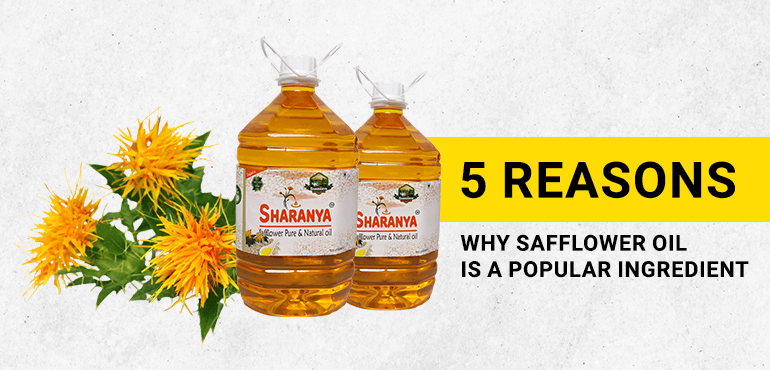
5 Reasons Why Safflower Oil is a Popular Ingredient
Sunflower oil is a popular ingredient in cooking and baking for several reasons:
High smoke point: Sunflower oil has a high smoke point, which means it can be heated to a high temperature without smoking or burning. This makes it suitable for frying and sautéing.
Light flavor: Sunflower oil has a light, neutral flavor that does not overpower the taste of other ingredients. This makes it a good choice for use in salad dressings and marinades, as well as in baking.
Rich in Vitamin E: Sunflower oil is rich in Vitamin E which is an important antioxidant that can help to protect cells from damage and improve skin health.
Low in Saturated Fat: Sunflower oil is low in saturated fat, which is the type of fat that can raise cholesterol levels and contribute to heart disease. It is high in monounsaturated and polyunsaturated fats which can be beneficial for heart health.
Affordable: Sunflower oil is relatively affordable compared to other types of oils, making it a popular choice for home cooks and bakers. It's widely available in most of the supermarkets and grocery stores.
Boosts Energy: Saturated fats in vegetable oils can make you feel dull, but unsaturated fats in sunflower oil energize you. These unsaturated fats help your body discharge glycogen into the bloodstream from the liver. It is a type of sugar responsible for that quick energy boost. Along with energy, unsaturated fats also help in the overall maintenance of health. Choosing cold-pressed organic sunflower oil is always recommended for cooking and other applications.
Improves Skin Health: Sunflower oil is a good source of Vitamin A and E that promote skin health. These vitamins work as antioxidants. Vitamins A and E also regenerate damaged skin cells and remove acne-causing bacteria. The best sunflower oil, i.e., organic sunflower oil, is also suitable for external usage. Using sunflower oil on the skin may give you a moisturizing effect. It is usually light and non-greasy, absorbed in the skin quickly, and doesn’t block the pores.
Improves Hair Quality: Cooking with sunflower oil and including it in your diet also benefits your hair. Sunflower oil is an excellent source of Vitamin E, Oleic acid, Linoleic acid, and sesamol. Vitamin E and Sesamol are antioxidants and may help neutralize free radicals in the body that can damage the scalp and hair. With its light texture, sunflower oil is a natural ingredient in conditioners. You can directly apply it to your scalp one time in a week, and you may get benefits like soft, silky hair. Sunflower oil is also a good source of gamma alpha linolenic acid (GLA) which may help you if you are experiencing hair loss.
5 Of The Best Organic Oil Options For Healthy Cooking
When it comes to healthy cooking, using organic oils can be beneficial as they are free of chemicals, pesticides, and genetically modified organisms (GMOs). Here are five organic oil options that are commonly used in healthy cooking:
Olive Oil:
Extra-virgin olive oil is made from the first cold-pressing of the olives and is high in monounsaturated fats, which can help to lower cholesterol levels and improve heart health. It also has a low smoke point, so it's best to use it for dressings and marinades, rather than for high-heat cooking.
Coconut Oil:
Coconut oil is high in saturated fats, which can raise cholesterol levels if consumed in excess. However, it also has antimicrobial properties and can be beneficial for maintaining a healthy gut. It is a good oil for high-heat cooking such as frying, sautéing and baking.
Avocado Oil:
Avocado oil is high in monounsaturated fats and antioxidants and it has a high smoke point, making it suitable for high-heat cooking. It has a distinct but mild flavor that makes it a good option for dressings, dips and marinades.
Flaxseed Oil
Flaxseed oil is high in omega-3 fatty acids and is a good option for those looking to improve their heart health. It has a low smoke point and should be used in dressings and as a topping rather than for cooking.
Walnut Oil:
Walnut oil is high in omega-3 fatty acids and antioxidants, and has a nutty flavor that is great for dressings and marinades. It also has a low smoke point and should be used for dressings and as a topping rather than for cooking.
It's important to note that these oils are healthier options but they should still be consumed in moderation, as they are calorie-dense and can contribute to weight gain if consumed in excessive amounts. Also, always read the labels before purchasing to ensure the oil is truly organic and Non-GMO.
Our Products
- Safflower Oil0.5 liter
- Safflower Oil1 liter
- Safflower Oil2 liter
- Safflower Oil3 liter
- Safflower Oil5 liter